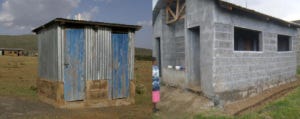by Rezwana Abed, Rasagya Kabra, Austin Land, and Cristian Ugarte
Goldman School of Public Policy, UC Berkeley
Our work with Asante Africa Foundation began as part of a graduate policy analysis project at UC Berkeley’s Goldman School of Public Policy. Specifically, we aimed to strengthen Asante Africa Foundation’s Girls’ Advancement Program by integrating a greater focus on safe and sanitary latrines. They solicited our help to provide an evidence-based rationale regarding the impact of sanitary latrines in promoting girls’ access to education, and seek research-based interventions to address the problems of supply deficiency with regard to school-based sanitation facilities. These issues are widespread and impactful. School-based sanitation facilities are scarce in rural Kenya and Tanzania; the consequences of this supply deficiency are poor educational outcomes- borne disproportionately by female students.

To achieve greater clarity regarding this issue, we conducted extensive literature reviews and examined numerous school-based sanitation interventions designed to overcome potential barriers to school attendance. In other words, we looked at the efficacy of several different measures that had been used for the sanitation problem in the past. Thereafter, we analyzed the research evidence for the role of sanitary latrines in promoting girls’ access to education. To supplement our analysis, we also provided Asante Africa Foundation with a review of best-practice design features for the construction of school latrines.
Our analysis reveals clear evidence that latrine construction has promising gains to deliver in terms of increased access to education for girls. Additionally, it is advisable to use hand-washing facilities and sanitary pads as complementary measures to latrine construction, to mitigate the risk of contamination. Seemingly minor, our research suggests that sanitary pads are expected to increase access to education for girls by facilitating comfortable and private menstrual hygiene management. Hence, providing them and allowing for appropriate changing and disposal facilities helps girls attend school during menstruation. Ideally, latrine construction efforts should provide rainwater capture and ensure an adequate latrine-to-student ratio.
Overall, our experience with Asante Africa Foundation has been extremely positive. We are very thankful to have worked with people who are motivated to build a better world. Consistent with Asante Africa Foundation’s “Pay It Forward” philosophy, we are delighted to provide our support and experiences in helping the organization expand.




